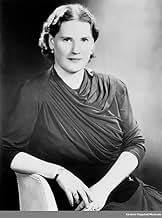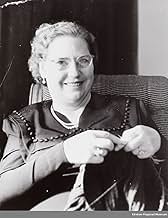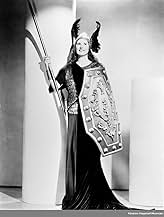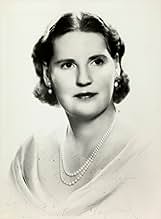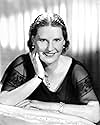Kirsten Flagstad(1895-1962)
- Actress
- Soundtrack
Born in Stranstuen, Hamar, Norway, Norwegian soprano Kisten Flagstad's
father was a conductor, and her mother was a singing coach and pianist
as well as her first teacher. Flagstad continued her studies in Oslo
with Ellen Schyte-Jacobsen and in Stockholm with Dr. Gillis Bratt.
While still a student, she made her début at the National Theater in
Oslo in 1913 as Nuri in D'Albert's Tiefland. For the next 18 years she
sang exclusively in Scandinavia, performing in opera, operetta and
musical comedy. Flagstad's first Isolde in Oslo in 1932 led to Bayreuth
engagements in minor parts in 1933 and to roles as Sieglinde and
Gutrune in 1934. Later in 1934, Flagstad turned her sights on North
America and auditioned at the Metropolitan Opera to succeed the
reigning Wagnerian soprano Frida Leider. Her unheralded Met début as
Sieglinde, broadcast nationwide on February 2, 1935, created a
sensation. Four days later, she sang Isolde, and later that month,
performed Brünhilde in Die Walküre and Die Götterdämmerung for the
first time. Almost overnight she was regarded as the pre-eminent
Wagnerian soprano of her generation. Later that season, Flagstad also
sang Elsa, Elisabeth, and her first Kundry. Fidelio (1936) was her only
non-Wagnerian role at the Met before the war. She sang the same
repertory in San Francisco in 1935-38 and in Chicago in 1937.
In 1936 and 1937 she performed the roles of Isolde, Brünhilde and Senta at Covent Garden under Sir Thomas Beecham, Fritz Reiner and Wilhelm Furtwängler, arousing as much enthusiasm there as in New York. In 1941 Flagstad returned to Nazi-occupied Norway to join her second husband, whose collaboration with the Nazis led to his arrest after World War II. Although her own wartime record was free from controversy, her return to Norway during the war and a certain political naïvété in her nature created much ill-feeling towards her, particularly in the USA.
During four consecutive Covent Garden seasons, from 1948 to 1951, Flagstad repeated all her regular Wagnerian roles, including Kundry and Sieglinde. She returned to San Francisco in 1948 but was not invited back to the Metropolitan Opera until Sir Rudolph Bing became manager. In the 1950-1951 season, although she was well into her 50s, she showed herself still in remarkable form as Isolde, Brünnhilde and Fidelio. Flagstad's final role at the Metropolitan Opera was as Alceste in Gluck's opera. Her final operatic performances were as Purcell's Dido at the Mermaid Theatre in London in 1953. Flagstad continued to record and sing concerts, and was director of the Norwegian National Opera from 1958-1960.
The enduring purity, beauty and power of Flagstad's tone probably owed much, not only to natural gifts and sound training, but to the enforced repose of the war years and the fact that she had undertaken no heavy roles until middle life. She was regarded as an impeccable musician in matters of rhythm and intonation. While she was not the most dramatic or magnetic of Wagnerian heroines, no one within living memory surpassed her sheer beauty and consistency of line and tone. Of her many records, the complete Tristan und Isolde with Furtwängler undoubtedly offers the finest memorial to her interpretive art in its maturity. Her pre-war recordings, however, showcase her voice in its freshest brilliance and clarity.
In 1936 and 1937 she performed the roles of Isolde, Brünhilde and Senta at Covent Garden under Sir Thomas Beecham, Fritz Reiner and Wilhelm Furtwängler, arousing as much enthusiasm there as in New York. In 1941 Flagstad returned to Nazi-occupied Norway to join her second husband, whose collaboration with the Nazis led to his arrest after World War II. Although her own wartime record was free from controversy, her return to Norway during the war and a certain political naïvété in her nature created much ill-feeling towards her, particularly in the USA.
During four consecutive Covent Garden seasons, from 1948 to 1951, Flagstad repeated all her regular Wagnerian roles, including Kundry and Sieglinde. She returned to San Francisco in 1948 but was not invited back to the Metropolitan Opera until Sir Rudolph Bing became manager. In the 1950-1951 season, although she was well into her 50s, she showed herself still in remarkable form as Isolde, Brünnhilde and Fidelio. Flagstad's final role at the Metropolitan Opera was as Alceste in Gluck's opera. Her final operatic performances were as Purcell's Dido at the Mermaid Theatre in London in 1953. Flagstad continued to record and sing concerts, and was director of the Norwegian National Opera from 1958-1960.
The enduring purity, beauty and power of Flagstad's tone probably owed much, not only to natural gifts and sound training, but to the enforced repose of the war years and the fact that she had undertaken no heavy roles until middle life. She was regarded as an impeccable musician in matters of rhythm and intonation. While she was not the most dramatic or magnetic of Wagnerian heroines, no one within living memory surpassed her sheer beauty and consistency of line and tone. Of her many records, the complete Tristan und Isolde with Furtwängler undoubtedly offers the finest memorial to her interpretive art in its maturity. Her pre-war recordings, however, showcase her voice in its freshest brilliance and clarity.

